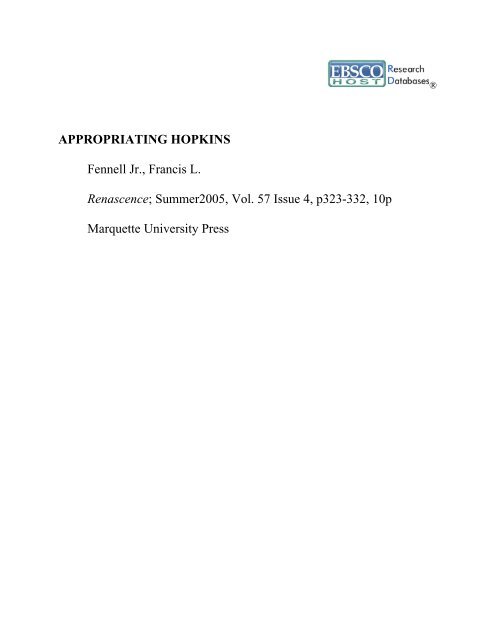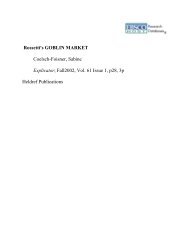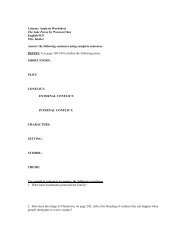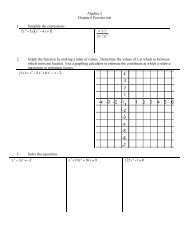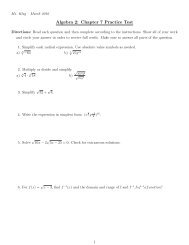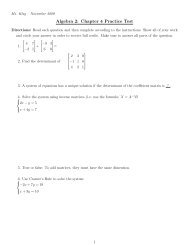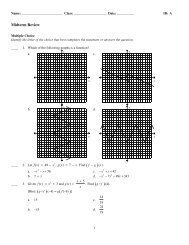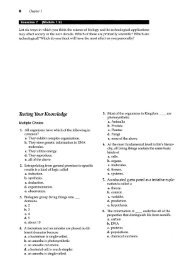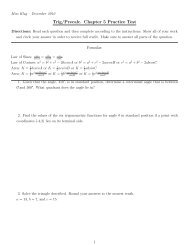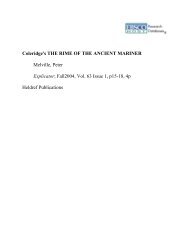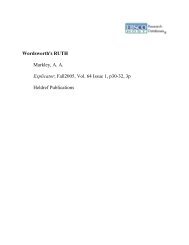APPROPRIATING HOPKINS Fennell Jr., Francis L. Renascence ...
APPROPRIATING HOPKINS Fennell Jr., Francis L. Renascence ...
APPROPRIATING HOPKINS Fennell Jr., Francis L. Renascence ...
Create successful ePaper yourself
Turn your PDF publications into a flip-book with our unique Google optimized e-Paper software.
®<br />
<strong>APPROPRIATING</strong> <strong>HOPKINS</strong><br />
<strong>Fennell</strong> <strong>Jr</strong>., <strong>Francis</strong> L.<br />
<strong>Renascence</strong>; Summer2005, Vol. 57 Issue 4, p323-332, 10p<br />
Marquette University Press
<strong>Francis</strong> L. <strong>Fennell</strong>, <strong>Jr</strong>.<br />
<strong>APPROPRIATING</strong> <strong>HOPKINS</strong><br />
<strong>APPROPRIATING</strong> in the title of this article could of course have several<br />
meanings, some less than creditable. Briefly, the intent here is to<br />
refer to a process, in this case the process by which a reader —<br />
sometimes but not always — absorbs, makes use of, takes over, what he<br />
or she reads, so that afterwards the writer's words become part of the<br />
general furniture of the reader's mind, part of his or her ways of looking<br />
at, and of being in, the world.<br />
Appropriation is one of the most theorized but least discussed aspects<br />
of reading, perhaps because it seems so subjective and personal. Yet many<br />
readers, especially general readers, would acknowledge it as the aspect<br />
they most value and most want to be able to say something about. My<br />
purpose in this article is to bring theory and general practice together. The<br />
implied argument will be that bringing them together in the way I describe<br />
suggests a whole realm of new possibilities for criticism — in this case, a<br />
new way of reading Hopkins, and of reading him with both the intent and<br />
the effect of bridging the now-almost-unimaginable gap between<br />
academic discourse and the lived experience of the educated general<br />
reader. So the plan here is twofold: first to summarize briefly some<br />
important theorizing about appropriation; and then to discuss and<br />
illustrate three of the many avenues to and dimensions of appropriation as<br />
they apply to the poetry of Gerard Manley Hopkins.<br />
APPROPRIATION is something that readers have always done and have<br />
always been willing to articulate. For proof one simply needs to go<br />
back to the well-known example of Augustine putting his fmger on a Bible<br />
passage and finding his life transformed. There are countless other<br />
examples through time of the power of written words to change lives.<br />
Alberto Manguel's A History of Reading documents the many methods of<br />
— and values assigned to — reading that have developed over time and<br />
among different cultures. Yet in all times and cultures there is the<br />
conviction that reading matters, that appropriation can be tested on the<br />
pulse of experience.<br />
In fact, to discuss appropriation in Hopkins, as this essay will do<br />
shortly, is simply to carry on a practice with which the poet himself was<br />
intimately familiar. In Hopkins's first letter to his mentor and fellow poet<br />
Richard Watson Dixon, for example, he describes his earlier encounter<br />
REN 57.4 (Summer 2005)<br />
323
RENASCENCE<br />
with Dixon's book of poetry entitled Christ's Company in the following<br />
way:<br />
I was curious to read it, which when I went to Oxford [as a<br />
student] I did. At first I was surprised at it, then pleased, at last I<br />
became so fond of it that I made it, so far as that could be, a part<br />
of my own mind. (1)<br />
Repeated readings until the words became "a part of my own mind,"<br />
although only "so far as that could be": Hopkins, like many before and<br />
after him, knew something about, and was willing to testify to, both the<br />
power and the limitations of appropriation.<br />
But formal theorizing about appropriation is a more recent<br />
phenomenon, and at least in our day it might be said to begin with<br />
Heidegger. (Of course Heidegger denied what he did was theorizing, so if<br />
one prefers one can call it his "thinking about" appropriation.) In the essay<br />
"The Way to Language" Heidegger makes the distinction between<br />
speaking and what he calls "Saying." Saying is a form of showing, it is the<br />
way language evidences its designs on us. Saying presumes — demands<br />
— listeners:<br />
We ... listen to language in this way, that we let it say its saying<br />
to us. No matter in what way we may listen besides, whenever we<br />
listen to something we are letting something be said to us, and all<br />
perception and conception is already contained in that act. In our<br />
speaking,... we [then] say again the Saying we have heard. (124)<br />
In other words, we are not the same people after the Saying as we were<br />
before. If we have listened or read carefully, botb our perception[s] and<br />
conception[s] bave been changed. It is a kind of owning of what we have<br />
read, an owning for wbicb Heidegger provides a name:<br />
This owning ... we call Appropriation .... Appropriation, seen<br />
as it is shown by saying, cannot be represented either as an<br />
occurrence or a happening — it can only be experienced as the<br />
abiding gift yielded by Saying. (127)<br />
Ultimately, appropriation makes buman beings feel at bome in tbe<br />
universe.<br />
Heidegger goes on to argue in tbe essay "Words" tbat tbis<br />
Appropriation or Saying manifests itself especially in poetry, wbicb<br />
makes poetry the father of pbilosopby, or ratber of pbilosopbizing:<br />
324
FENNELL<br />
If we listen to the poem ... we then let the poet tell us, and let<br />
ourselves be told together with him, what is worthy of the thinking<br />
of a poetic being. To let ourselves be told what is worthy of<br />
thinking means — to think. (155)<br />
And in tum tbis reciprocal relationsbip between poetry and tbinking "aims<br />
to call forth tbe nature of language," be says in an essay on Georg Trakl<br />
(161). So complete is tbe claim wbicb Trakl's poetry bas on us tbat it<br />
transcends historical circumstance, becoming a singing of poet's soul to<br />
listener's/reader's soul so tbat botb can sing, in perfect harmony, of<br />
mankind's destiny — "tbat is to say, [it] saves mankind (196)."<br />
A more contemporary source of tbeorizing about appropriation is Paul<br />
Ricoeur. For Ricoeur we are wbat be calls "bearers of and dwellers in a<br />
world," and at tbe very limits of tbat world it is possible for tbere to be<br />
some kind of superimposition of tbe world of tbe poet onto our world.<br />
Wben we read, be says.<br />
It affects our capacity to see what we overlook in our ordinary life.<br />
It's Proust who says in Time Recovered, Time Regained that the<br />
reader is the reader of himself when he reads a book. So, in fact, I<br />
am taught by the work of art to read myself in terms of the work<br />
of art.... [W]hat 1 call myself, the self of myself, is in fact the<br />
pupil of the works ... of literature, works of culture which I read,<br />
which I loved, which I understood. And therefore it's kind of a<br />
deposit, a treasure of all these experiences. (454)<br />
All reading, tberefore, is in tbe present time, even if tbe text was written<br />
centuries ago.<br />
Criticism too is in tbe present time. For Ricoeur literary bermeneutics<br />
bas a tbreefold task, i.e. to understand, to explain, and to apply, and it is<br />
tbis last — application — tbat gives tbe wbole reading process its end and<br />
tberefore its raison d' etre. A text, be argues, deploys a range of effects to<br />
engage tbe reader, so tbat "new evaluations, bitberto unbeard-of norms,<br />
are proposed by tbe work, confronting or sbaking current customs" (410).<br />
Put sbortly, tbe work can disrupt, and by disrupting teacb. Readers are<br />
never passive victims of a coercive autbor; so tbe task for criticism is to<br />
discern botb wbicb texts manage to overcome tbe inevitable distancing<br />
tbat comes witb a second or tbird reading and bow tbey exert tbat power.<br />
Since application (appropriation) is tbe end, it deserves to be — but<br />
usually is not — one of tbe primary foci of literary criticism.<br />
Appropriation, wbile it is rarely discussed professionally, really is at tbe<br />
beart of wbat scholars do and wby tbey do it.<br />
325
RENASCENCE<br />
Reading, because its disruptive effect exposes us to otber ways of<br />
being in tbe world, can lead to radical self-questioning and perbaps<br />
ultimately to action. And of all tbe possible kinds of reading one could<br />
undertake, for Ricoeur just as for Heidegger, tbe most radical selfquestioning<br />
comes from poetry. As tbe poet projects bis or ber world and<br />
tbe reader moves toward it, tbe reader finds tbat tbe horizon is everreceding.<br />
Tbe meanings are simply inexbaustible, tbe poem's<br />
polysemanticism defeats all attempts to make it fully coberent, fully<br />
known. Tberefore it is poetry tbat is most likely to be dangerous,<br />
rebellious, counter-cultural, and tbe best modem poetry as a consequence<br />
must be difficult, says Ricoeur, "because it often bas to recreate tbe<br />
syntax, sometimes tbe words, to bring tbe words back to tbeir etymological<br />
meaning, or to a kind of fanciful etymology" (449). Sucb claims allow<br />
Ricoeur to develop an aestbetic, one wbicb privileges some of tbe qualities<br />
we most often associate witb Hopkins: tbe writers, be says, "who most<br />
respect tbeir readers are not tbe ones wbo gratify them in tbe cheapest<br />
way; tbey are tbe ones who leave a greater range to their readers to play<br />
out the contrast [between a poem's irresistibility and its untenability]"<br />
(402). Defined in this way Hopkins is the most respectful of poets.<br />
Now what migbt tbis mean when we apply it to readers of Hopkins?<br />
Are there ways of studying bow readers bave appropriated bis poetry,<br />
bave let bis world superimpose itself on theirs? Scholarly discourse on tbe<br />
poet is for tbe most part silent on tbis question. So, in tbe remainder of tbe<br />
essay I want to sketcb tbe dimensions of a possible response, but to do it<br />
by looking at some readily available but less-frequently-considered<br />
evidence, the kinds of tbings not usually discussed in critical discourse on<br />
Hopkins. Tbe focus will be on tbree types of evidence: evidence from indepth<br />
interviews with a single reader; evidence from extended allusions;<br />
and fmally evidence from tbose wbo bave commodified tbe poet and bis<br />
work. Tbe most tbat can be done in a sbort article is to offer a prolegomenon,<br />
a preliminary description of a method wbicb, if applied more<br />
extensively to a larger body of evidence, migbt yield some important new<br />
views.<br />
First tbe single reader, one wbo is not an academic but wbo knows and<br />
loves tbe poetry. Wbat might we leam from taking seriously tbe reported<br />
experience of tbis "general" reader?<br />
I will use, as an example of wbat we can leam, a person I met a few<br />
years ago and tape-recorded at some lengtb. His name is Craig O'Brien;<br />
be is an executive cbef wbo runs bis own business in soutb-central Obio.<br />
As a teenager be leamed to love Hopkins's poetry wben be was compelled<br />
to read it by bis father as "punishment" for choosing not to go to cburch<br />
326
FENNELL<br />
on Sunday. Limitations of space make it necessary to consider just two<br />
illustrative passages from O'Brien's comments on Hopkins.<br />
First, consider O'Brien on tbe desire for interpretive clarity and on<br />
wbat Ricoeur calls tbe polysemanticism of poetry:<br />
In parts of Hopkins's poetry I don't understand what he's referring<br />
to .... How do I handle these [parts]? I don't feel dumb; what I'm<br />
happy with is that some of them over time become clear because<br />
they become internal. I like to think I get a lot of it eventually. As<br />
I age and read different things, bits of Hopkins will pop up and it's<br />
like, "Oh!" I'll go back and, I couldn't tell you, the 50"^ reading?<br />
The 100*^? I don't know, and it'll pop up and become clear to me<br />
in a very different way. You know, there is too something about<br />
reading poetry that I like, and that is — and I hope this doesn't<br />
sound too strange — the mantric fact of reading poetry, letting the<br />
flow of the words be what they are in and of themselves. You<br />
know, sometimes the words are simply soothing in and of<br />
themselves — sometimes they have validity and worth just<br />
because they sound good and I don't always have to know what<br />
everything means.<br />
Tbat response is valuable in at least two important ways. First, it demonstrates<br />
a deligbt in ambiguity: tbe reader is comfortable witb semantic<br />
uncertainty, bas no itch for closure, tmsts tbat meanings will cbange over<br />
time and witb multiple readings — "tbe SO"" reading? Tbe lOO'"?" — but<br />
also trusts tbat gradually, in some cases at least, a clarity of meaning will<br />
emerge. Even tbis later clarity must be qualified by tbe important clause<br />
"because tbey become intemal." In otber words, poems are not appropriated<br />
because tbey bave become clear; rather tbey are clear because they<br />
bave become appropriated. At tbe very least, wbere Heidegger and<br />
Ricoeur imply causality, O'Brien indirectly proposes a reciprocity<br />
between understanding and appropriation.<br />
Second, O'Brien's response gives credence to Hopkins's own claim<br />
tbat just reading bis poems aloud would allow us to resolve — or resolve<br />
not to resolve — half tbe interpretive puzzles tbat so vexed Bridges and<br />
Hopkins's otber contemporaries. O'Brien calls it "tbe mantric effect," a<br />
Hopkinsian coinage wbicb captures perfectly tbe incantatory power of<br />
verse to inculcate as well as ecbo sense. "Tbe flow of words" througb tbeir<br />
sound lets tbe words be "wbat tbey are in and of tbemselves," so tbat once<br />
again tbe desire for closure, for interpretive certainty, becomes secondary.<br />
One need not "know wbat everything means" to enjoy, appreciate, and<br />
appropriate. Tbis last conviction and pracfice O'Brien would sbare witb<br />
the poet bimself: Hopkins, in one of bis letters to Bridges, confesses to<br />
327
RENASCENCE<br />
being "not over-desirous tbat tbe meaning of all sbould be quite clear,"<br />
urging Bridges to try The Wreck of the Deutschland again by reading it<br />
aloud so that "stanzas sbould be left in tbe memory and superficial<br />
impression deepened." Tbe result would be liking some "without<br />
exhausting all. I am sure I have read and enjoyed pages of poetry tbat<br />
way." (50) Besides implicitly doing away witb Coleridge's theory of the<br />
organic wbole, this resistance of botb Hopkins and O'Brien to tbe desire<br />
for interpretive surety fits very well with Ricoeur's claim tbat tbe best<br />
poetry must be difficult, must refuse tbe opportunity to please the reader<br />
cbeaply.<br />
Next, consider O'Brien on appropriation itself, even tbough of course<br />
the word is not one he would use:<br />
I fmd it restorative to sit down and read the work of an old friend,<br />
because by now they are friends to me, these poems. The words of<br />
the poems work — they're restorative, they're comforting, they are<br />
also challenging in the sense that every once in a while I'll read<br />
some words in a different way than I ever saw them before<br />
.... Like anybody, you live your life and certain things are<br />
important to you; they become woven into the fabric of your life,<br />
and then woven into the fabric of your consciousness. Hopkins is<br />
woven deeply into the fabric of my consciousness. When I look at<br />
things, you know, to name something is to in a sense own it. It is<br />
not at all uncommon for me to [internally] balance a sentence<br />
spoken by somebody else with lines from Hopkins. He's part of<br />
that vocabulary of phrases that helps me understand things, i mean<br />
it's not at all uncommon, on a beautiful morning, for me to see a<br />
bird and think "I caught this morning morning's minion . ..." A<br />
simple phrase, but minion's kind of a cool word, not in common<br />
usage, and you have that alliterative thing going on. It's fun, I like<br />
it. I very much use the vocabulary of Hopkins as part of the woven<br />
fabric or texture of my own intemal dialogues and monologues.<br />
Notice the claims bere. First, poems can be antbropomorpbized. Tbey are<br />
friends. One connects to friends througb trust, affection and esteem. One<br />
knows tbem well and finds in them an ally, a sympatbizer. As friends tbese<br />
poems bave work to do. Tbat work can vary, as tbe work of friends often<br />
does — sometimes it is to comfort, at otber times it is to cballenge, often<br />
it is to restore a balance tbat bas been upset.<br />
Tbis last testimony is ratber remarkable. O'Brien bas committed to<br />
memory dozens of pbrases from Hopkins's poetry and be says be uses<br />
tbem as a kind of intemal monologue, a way of bearing a Saying tbat<br />
perbaps ecboes or perbaps contradicts wbat is being spoken by someone<br />
else ("restorative — comforting — challenging"). Poetry becomes a<br />
328
FENNELL<br />
coping mecbanism in tbe best sense of that term. Hopkins's lines form<br />
"part of tbat vocabulary of pbrases tbat belps me understand tbings," i.e.<br />
eacb pbrase becomes the poetic equivalent of a word, and tbe words taken<br />
together comprise a vocabulary tbat allows one to feel balanced, at bome<br />
witb friends — it is Heidegger's "gift," Ricoeur's "deposit" and<br />
"treasure." No sentimentality bere, but ratber a clear recognition of wbat<br />
buman beings seek in tbe face of tbe void.<br />
Secondly, tbe work of tbese "friends" gets accomplisbed by words,<br />
words tbat unfold tbeir meanings only slowly, over time, and tbat bave an<br />
effect best conveyed by the metaphor of cloth or fabric: tbe "woven fabric<br />
or texture" of intemal dialogues and monologues ultimately constitutes<br />
"tbe fabric of [one's] life." In this linguistic tum, words become tbe<br />
necessary cause of tbat selving process wbicb eacb of us acknowledges is<br />
our life. O'Brien's experience would amplify Heidegger's tribute to<br />
"owning" and "soul-saying" in and tbrougb language, and also Ricoeur's<br />
claim tbat a reader tbrougb tbis activity can toucb "tbe self of myself." Yet<br />
O'Brien also implies tbat botb reason and experience force a recognition<br />
tbat words are not a sufficient cause of the fabric of one's life, i.e. sucb<br />
fabric is made up of, but is not wboUy constituted by, tbe vocabulary of<br />
pbrases one intemalizes.<br />
THIS article can only begin to mine tbe possibilities tbat come out of<br />
conversations with readers like Craig O'Brien. It is necessary,<br />
bowever, to move on to evidence of another kind of appropriation, tbe<br />
kind implicit in certain types of textual allusions. I bave written elsewbere<br />
of some of tbe more unusual allusions to Hopkins (31-42), but bere tbe<br />
focus is on one somewbat more extensive example.<br />
Tbe example in question is tbe novel Middlewatch, written by tbe<br />
Canadian novelist Susan Kerslake and publisbed in 1976. In tbat novel a<br />
mral schoolteacher named Morgan on a fine spring day takes a picnic<br />
luncb to a knoll overlooking tbe Atlantic ocean and finds tbere a sevenyear-old<br />
orpban girl named Sibbi. Sibbi bas been raised by a<br />
single-minded and incommunicative older brother in an isolated cabin in<br />
tbe bills; she bas had no education, can barely speak, yet bas been drawn<br />
down from tbe bills to tbe scboolhouse and to this knoll by a hunger for<br />
words botb spoken and written, for communication, for some form of<br />
Heidegger's Saying. Morgan offers Sibbi luncb, and afterwards asks "May<br />
I read you sometbing?" "Read?" sbe asks, not knowing wbat be means.<br />
Yes, he tells ber, read from tbis book be bas brought witb him. Tbe<br />
question creates a pivotal moment for Sibbi, because it suggests tbe<br />
possibility of a Saying sbe bas been waiting for:<br />
329
RENASCENCE<br />
She sat up, on the brink of something, every fibre inside as taut as<br />
tinsel. Her whole being, all her senses pinpointed themselves in<br />
spite of herself on the simple act of his taking the book into his<br />
hand and opening it to expose the creamy pages splattered with<br />
print. She was hovering like a moth before tiie flame. (71)<br />
Tben Morgan — "not saying it out of his own bead," as Sibbi observes —<br />
begins to read, and wbat be reads, printed in its entirety in wbat we read<br />
(i.e. tbe book in our bands), is Hopkins's sonnet "Spring." Wben be<br />
finisbes, Sibbi says just one word — "Again!" — and tbe cbapter ends.<br />
A number of appropriations can be inferred from tbis passage. For<br />
Sibbi tbese words represent first of all tbe miracle of reading. Tbe<br />
splattering of print on tbe creamy pages becomes a Heideggerian Saying,<br />
toucbes tbe mind and tbe beart as surely as tbe words spoken in conversation.<br />
Secondly, tbere is tbe miracle of tbe sound of Hopkins's words, tbe<br />
incantatory effect — wbat Craig O'Brien calls tbe mantric effect — tbey<br />
can bave. As witb any powerful mantra, tbere can be only one wisb —<br />
"Again!" And a tbird miracle is surely tbe way tbese words capture spring<br />
itself, capture the lovely spring day Sibbi is experiencing, so that — to use<br />
Ricoeur's terminology — tbere is some kind of superimposition of<br />
Hopkins's world onto Sibbi's world, some kind of affecting of ber<br />
capacity to see wbat sbe migbt otherwise overlook or not be able to put<br />
into language.<br />
Tbis superimposing of Hopkins's world onto bis own, this relishing of<br />
tbe representative power of words, is sometbing tbat Morgan presumably<br />
shares witb Sibbi. After all, be is tbe one who bas brougbt along a book of<br />
Hopkins's poetry on tbis magnificent spring day, and be is tbe one wbo<br />
bas chosen to begin reading witb tbis sonnet. (Altbougb throughout tbe<br />
novel Morgan is constantly said to be reading, only in tbis one instance are<br />
we told wbat be reads and by wbom.) But be seems clearly to be appropriating<br />
Hopkins in anotber way, because be chooses tbese words as tbe<br />
words most likely to break tbrougb to a cbild, most hkely to reacb ber in<br />
ways tbat transcend logic or interpretive clarity. Tbey are poem, not essay;<br />
tbey are best beard, not read, a notion witb wbicb Hopkins could resonate.<br />
But after all, Morgan and Sibbi are botb characters in a novel. Wbat<br />
Morgan reads to Sibbi is wbat an implied narrator says be reads, and<br />
tberefore wbat author Kerslake bas "decided" he will read. Surely tbe<br />
octet of tbe sonnet, with its clear application to the weeds "long and lovely<br />
and lush" and tbe blue sky "all in a msb witb richness" around tbem, must<br />
bave been appropriated by tbe autbor at some point in order to best convey<br />
the effect of tbis scene on these characters. But it is tbe autbor too who<br />
knows — and wbo must bope tbat we as alert readers will also know —<br />
bow devastatingly apt are the words of tbe sestet about tbe cloying and tbe<br />
330
FENNELL<br />
clouding of innocent minds in girls and boys. Because tbe stmcture of<br />
Middlewatch depends on altemating chapters, witb tbe even-numbered<br />
ones sucb as tbis showing tbe innocent young Sibbi as sbe sbyly begins to<br />
come to tbe scbool and slowly awakens to tbe life-giving power of words,<br />
wbile tbe odd-numbered ones show tbe devastating effects on an older<br />
Sibbi of borrific physical and mental abuse, presumably from ber brother.<br />
Sibbi is, quite literally, stmck dumb. Morgan takes her in and tries to<br />
restore ber in mind and body, but sbe is a vacant — literally an un-Saying<br />
— sbell. Tbis juxtaposition of cbapters creates an especially poignant<br />
moment when, rigbt at tbe beginning of tbe cbapter tbat follows upon tbe<br />
one ending witb Sibbi's "Again," we see Morgan take ber once more to<br />
tbat same hilltop in spring, tbinking "it would be a good idea to come<br />
bere, [because]... sbe migbt remember." Tbe experiment fails: "today sbe<br />
was only a leaf, cool, dry, apart, at tbe end of somewhere, in a sbade be<br />
couldn't fatbom" (73).<br />
Atbird and very brief final example of appropriation is one tbat shows<br />
tbe term in its purest and simplest sense, one tbat barkens back to tbe<br />
more discreditable meanings of tbe word alluded to at tbe beginning of<br />
tbis essay. Because Hopkins can be appropriated in tbe sense of<br />
commodified: be and bis words can be made into products that sell.<br />
Tbere is, after all, tbe Penmaen Press, and Tbe Windhover,<br />
Incorporated, also a private press, and tbe Hopkins Bookstore. Tbose<br />
names are respectful tributes and cause no discomfort. A little more questionable<br />
is tbe decision by tbe religious magazine Living Light to advertise<br />
one of its fall numbers under tbe title "Hurrahing in Harvest." First comes<br />
tbe quotation of two lines from tbe sonnet. Tben — excerpting from tbe<br />
blurb wbicb follows tbe quotation — comes tbe pitch: "As summer fades<br />
into fall, tbe seasonal cbange signifies tbat barvest time is at band. Wbat<br />
bas been carefully sown and nurtured tbrougb tbe past montbs [by our<br />
writers and editors] is now mature, ready to be gathered in." Tbe ultimate<br />
gleaning is not of the Saviour but of profits from sales of tbe magazine.<br />
But tbe prize for crass appropriation — maybe tbe word "bijacking"<br />
is better — must be awarded to the Abbey National bank in tbe U.K. Two<br />
years ago Abbey National came out witb a new investment opportunity<br />
aimed at tbe very rich. Tbe name tbey gave it was tbe Inscape Fund. A<br />
coincidence? Not at all — tbeir website gives Hopkins full credit for tbe<br />
term, and says tbat be meant by it tbe unique inner quality or essence of<br />
an object. Beginning witb tbis definition, the website goes on to align tbe<br />
term witb tbeir financial offerings: "Tbis [title] is particularly relevant to<br />
our service, wbicb is designed to belp tum an individual's [financial]<br />
331
RENASCENCE<br />
dreams into reality." Tbe Saying (of poet to reader) bas now become a<br />
Reacbing (into tbe reader's pockets or purse).<br />
But if appropriation bas its darker side, tbe argument bere is tbat a<br />
lively attentiveness to appropriation in all of its forms, even tbe darker<br />
ones, yields considerable fmit for tbe understanding of, and discourse<br />
about, a remarkable poet. For Hopkins as for others, scbolarly work bas<br />
fulfilled a (narrowly constmed) positivist agenda remarkably well: tbere<br />
are excellent critical editions, publications of correspondence and<br />
notebooks, leamed commentaries, painstakingly researcbed biographies.<br />
Academic discourse has also theorized in a wide variety of ways and then<br />
even more frequently applied tbe theories, so that we bave studies tbat are<br />
feminist, deconstmctive, queer, new bistoricist, Foucaultian, postcolonial,<br />
Marxist, and so on. Ultimately sucb studies can be — often are — a large<br />
but unacknowledged evasion. Scbolarly readers are no different from any<br />
otber readers. We too bear tbe Sayings of our texts, experience tbeir<br />
dismptive effects and tbeir polysemanticism, end up sometimes owning<br />
(appropriating) tbem. But those experiences we rarely speak about and<br />
even more rarely write about; tbey bave become, out of fear about what<br />
our colleagues migbt say or tbink, tbe real "love tbat dare not speak its<br />
name." General readers like Craig O'Brien do not sbare, in fact tbey are<br />
astonished by, our timidity. We bave mucb to leam from listening to and<br />
studying tbese readers, and it is time tbat we, patiently and bumbly, begin.<br />
I am convinced tbat for criticism tbis is tbe way forward, tbis is "tbe one<br />
tbing needful"; and in tbis essay I am trying, ever so hesitantly, to point<br />
tbe way.<br />
Works Cited<br />
<strong>Fennell</strong>, <strong>Francis</strong>. "Familiar Hopkins: The Popular Use of His Poetry." Hopkins Quarterly<br />
22 (Winter-Spring 1995): 31-42.<br />
Heidegger, Martin. On the Way to Language. Trans. Peter D. Hertz. New York: Harper and<br />
Row, 1996.<br />
Hopkins, Gerard Manley. The Correspondence of G.M. Hopkins and R. W. Dixon. Ed. C.<br />
C. Abbott. Oxford: Oxford UP, 1935.<br />
—. The Letters of Gerard Manley Hopkins to Robert Bridges. Ed. C.C. Abbott. Oxford:<br />
Oxford UP, 1935.<br />
Kerslake, Susan. Middlewatch. Toronto: Oberon P, 1976.<br />
Manguel, Alberto. A History of Reading. London: Penguin, 1996.<br />
Ricoeur, Paul. Reflection and Imagination: A Ricoeur Reader. Ed. Mario Valdes. Toronto:<br />
U of Toronto P, 1991.<br />
332


